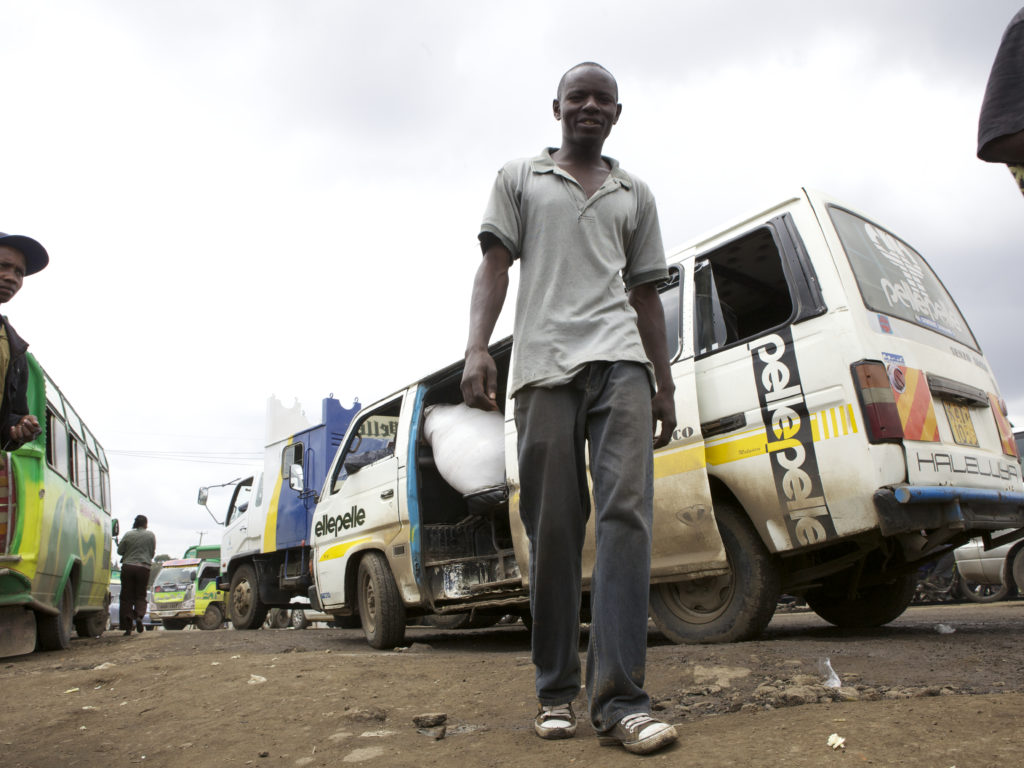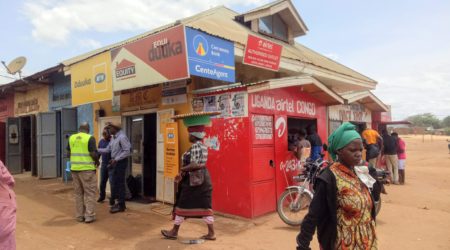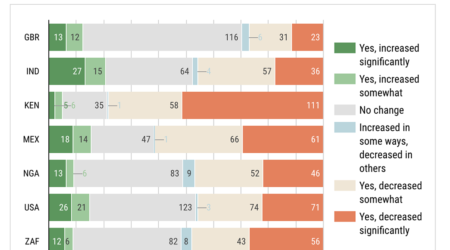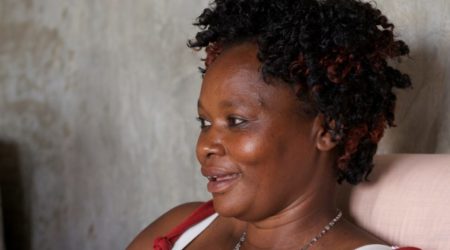When hustling fails: The impact of coronavirus mitigation efforts on ordinary people’s livelihoods

Originally posted on the FSD Kenya Website, April 6, 2020
Unlike many Kenyans, Esther in rural Makueni is not yet too worried about the impact of coronavirus (COVID-19) on her livelihood. A few years ago, her diabetic husband retired to the farm. They now help each other raising local chickens and tending two dairy cows. At home, his health has also improved. For now, they still have a market for both the chickens and the milk, and they have a store of dried grains from a bumper harvest last year. “We are doing just fine,” she says, “But things are going to be tough for those who are more vulnerable and those who live in cities and don’t have permanent employment. Most people will not die from corona, but from hunger.”
Trying to understand the impact of coronavirus on ordinary Kenyans, BFA Global and FSD Kenya have been working together to interview former Kenya Financial Diaries participants over the phone and see how they are navigating the crisis. Our relationships with respondents go back to 2012, providing us a basis for in-depth research without being physically present.
Our first 40 interviews are already providing powerful insights into how Kenyans are adapting economically to health fears, social distancing, curfews, and a significant drop in business sales and wage work. Eighty-eight percent of our respondents so far have already experienced significant drops in household incomes. The drops span a wide range of livelihood types, but seem to be hitting urban people hardest, making some rural families worried about the potential emerging need to care for urban kin, who may return to their rural homes empty-handed when remittances are needed most. They might also return infected with the virus itself, making matters even worse.
A hit against most livelihoods
Kenyans are renowned for their enterprising hustle, patching together an income tapestry from multiple, simultaneous sources. In the Kenya Financial Diaries, households had a median of five different income sources over the course of a year. Among those respondents we’ve already reached in our latest round of phone calls, the median household was earning about KES 12,000 ($120) per month in 2015. But what happens when holes get torn in that income tapestry as social distancing forces some businesses to close, as people staying home stop using services, and as many people try their best not to spend money they may need as the crisis worsens? Very few people have the option of “working from home,” particularly under these conditions.
Regular employment
- Few of our respondents had formal jobs to begin with. One working in a factory that produces toilet paper and other paper products feels his work is secure. They are producing as normal to meet persistent demand. A rural county government worker, however, tells us she has been sent home. While still receiving her salary for now, she wonders if her inability to do her work from home will mean her contract gets cancelled.
Self-employment
- Those who rely on salaried workers to buy their goods are losing massive amounts of business due to layoffs and workers sent away from the area, even if on paid leave.
- Those who had small kibandas or market stalls have had their businesses forcibly closed in many areas to prevent people from congregating. Some elderly respondents tell us that the young and fit might still be trying to sell their goods in a pop-up fashion, but you have to be ready to run from police at a moment’s notice. These vendors tend to be women whose incomes catered for the day to day needs of the household. Suddenly that piece of the household income puzzle is gone.
- Many selling cooked foods have closed completely.
- Even those with more established businesses, such as physical shops, are having difficulty making ends meet. Their customers are not out walking anymore, so walk-ins have dropped. Shops used to be places where people “hang out” buying snacks and sodas while they chatted with neighbours. Those sales are gone. Those who still have regular income seem to be stocking up at wholesalers in larger towns. All in all, revenues for small shops are down and shopkeepers worry if they will be able to restock given the lower revenues and higher transport costs they face. Some expect they will have to shut down, potentially interrupting the supply of basic goods to rural communities.
- Tailors are concerned that their customers have disappeared, too. No one is buying clothes or school uniforms when they are not sure if there will be money for food next week.
- Boda boda riders have much less business. One told us that he has had to hike prices, even for the few customers he still has. There’s no way for him to get return trips anymore.
- The matatu owners and drivers are similarly pinched. In Nairobi, one matatu driver was sent home while the owner decides what to do. Another operating out of Eldoret says his crew has been sending the owner KES 2000/day ($20) instead of the usual 9000 ($90). He is not sure how long they will keep running. A driver’s take home income has fallen from 600/day ($6) to 400/day ($4), with his crew only able to fill their matatu with the maximum of eight passengers 2-3 times per day now.
- One respondent who runs a car wash has seen his business shrink, too. Many boda boda riders have stopped working, and matatus can’t pass by for a wash after their workday ends, because of the 7 pm curfew.
Casual work
- Casual work has always been one of the least desirable ways of earning a living. Sadly, for many relying on these types of work, opportunities to keep working are drying up.
- Construction workers (mjengo) have seen jobs disappear, as those who were running building projects put them on hold, both to keep workers from congregating and to ensure their own cash reserves can help them meet more urgent needs through the crisis period. Those who are still getting construction work are working as much as possible now, anticipating that things will get worse as people hear rumours about a looming total lockdown in the country.
- Rural casual workers haven’t been spared either. Tea pickers have seen their incomes drop as they are paid by the kilogram of tea leaves picked. Factories are closing early due to curfew restrictions, forcing the farmers to send the days’ production several hours earlier than usual. The pickers we talked with have seen their incomes fall by a third this week.
- In different parts of Kenya, farmers are planting and harvesting. But, fear of outsiders coming near the home have led to fewer farmers hiring casual workers to help on the farm. Instead, children who are home from school are serving as a key source of agriculture labour in their place.
Agricultural livelihoods
- Those with agricultural production livelihoods have been impacted, too, if not always as severely. Many had a good harvest of basic grains from last year that will last them several months. However, others have used the little savings they had to buy immediate food and handwashing and sanitising supplies. They are not sure if they will come up with the money they need for farm inputs this season. Those who used to finance farming activities through remittances are unsure if the required remittances will still come through.
- One family with a large, one-acre vegetable farm lost its clients—Kisumu vendors in an open-air market—overnight. While trying to sell to local families, they are still making significant losses.
- Those families who are most secure have both a sizeable stock of maize from last year and one or two dairy cows. They continue to sell the milk locally, without aggregation needed. This provides a helpful, daily cash flow to help them cope with the challenges of lost income from other activities.
Uncertain social changes
But, those rural families who are doing okay for now, worry about the impact of role reversals with the husbands, children, and other relatives who had been working in cities in town. Rather than the rural families depending on urban remitters, city relatives may need help from their rural kin. This generates questions about how people’s social lives may change. Will they come home and create new burdens? Will they come home infected with the virus? Will they be stuck in cities and towns unable to meet their basic food needs?
The shifts of who is able to get an income and who has resources to draw from are rearranging some families already. One woman who lost her business in Nairobi and whose daughters can no longer help her out is thinking of going to her ex-husband’s rural home, that is, if her former sisters in law will have her. For other families, long lost husbands are coming home to the village strainingthe independent lives their wives have built without them. And some men, unable to earn a living, are questioning their own masculinity. “It’s not right for me to depend on my wife. It’s bad manners. She must be thinking, ‘This man is too much!’ It’s not in our African culture for things to be this way.”
Hopes for survival
For most, things are already tough, and most are bracing for things to get even worse. While work is getting put on hold, the resilient spirit of Kenyans persists. We have seen worse, they tell us. “I remember back in 1984,” Michelle in Eldoret says, “There wasn’t even food in the shops. This is nothing compared to then.” If we get in a tight spot, another respondent says, we’ll just eat porridge, like in the ‘80s.
“This is just a passing cloud,” says Lucy in Nairobi. “Soon things will be back to normal. We have faith.”
This is part of a series of rapidly-produced blogs on how low-income Kenyans are coping with the changes in their lives induced by the novel Coronavirus (COVID-19). Read more about the Kenya Financial Diaries project here. We will continue checking in with Diaries participants throughout the crisis. For the latest news and insights from this work, follow @FSDKe and @BFAGlobal on Twitter, as well as hashtags #Covid19DiariesKenya and #KomeshaCorona.



